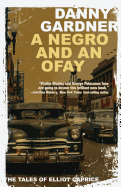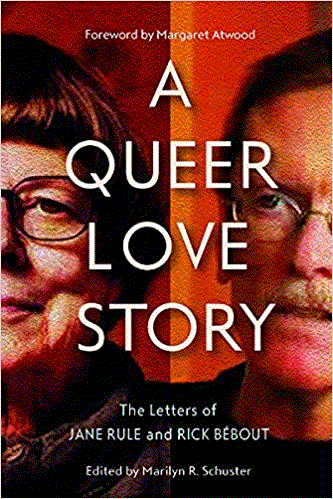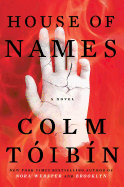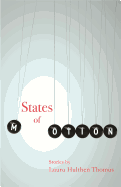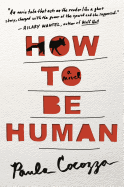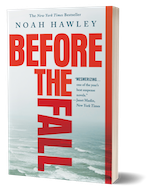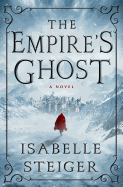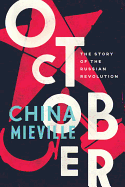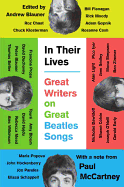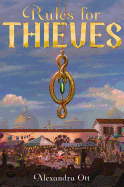Week of Tuesday, June 6, 2017
There are just 56 short stories and four novels in the original Sherlock Holmes canon--a wealth of excellent, engrossing literature on the one hand, and not nearly enough to sustain a lifetime of Holmesian entertainment on the other. So it is perhaps not surprising that authors have repeatedly taken up the character of Sherlock in new and intriguing ways. 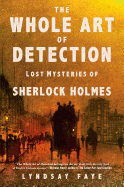 In The Whole Art of Detection, Lyndsay Faye captures the style, tone and approach that made the original Doyle stories so enduringly captivating across 15 short stories. (Her novel Dust and Shadow also features Holmes, imagining how he might have approached the Jack the Ripper mystery.) Sherry Thomas takes the reimagining a bit further in A Study in Scarlet Women, the first in a new series of novels in which Holmes is actually Miss Charlotte Holmes, a less-than-traditional Victorian woman assisted in her escapades by Mrs. Watson--widow of Mr. John Watson.
In The Whole Art of Detection, Lyndsay Faye captures the style, tone and approach that made the original Doyle stories so enduringly captivating across 15 short stories. (Her novel Dust and Shadow also features Holmes, imagining how he might have approached the Jack the Ripper mystery.) Sherry Thomas takes the reimagining a bit further in A Study in Scarlet Women, the first in a new series of novels in which Holmes is actually Miss Charlotte Holmes, a less-than-traditional Victorian woman assisted in her escapades by Mrs. Watson--widow of Mr. John Watson. 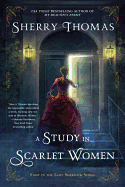 Across two anthologies, Sherlock experts and enthusiasts Laurie King and Leslie S. Klinger have collected and edited stories loosely inspired by the classic detective and his Good Doctor. Both A Study in Sherlock and In the Company of Sherlock Holmes feature dozens of authors, all writing in different styles. What makes these collections such fun to read is their diversity. Over the course of a few hundred pages, readers are treated to Sherlock in the 21st century, a story written as a series of Facebook posts, an imagining of a long-lived Sherlock serving at Dunkirk in 1940.
Across two anthologies, Sherlock experts and enthusiasts Laurie King and Leslie S. Klinger have collected and edited stories loosely inspired by the classic detective and his Good Doctor. Both A Study in Sherlock and In the Company of Sherlock Holmes feature dozens of authors, all writing in different styles. What makes these collections such fun to read is their diversity. Over the course of a few hundred pages, readers are treated to Sherlock in the 21st century, a story written as a series of Facebook posts, an imagining of a long-lived Sherlock serving at Dunkirk in 1940.
For those looking for their next Holmesian "fix," these books all offer impressively imaginative--yet consistently true-to-character--tales of Sherlock, Watson and their many capers together. --Kerry McHugh, blogger at Entomology of a Bookworm
House of Names
by Colm Tóibín
Colm Tóibín (Nora Webster) is one of fiction's greatest artists of humiliation and heartache. In The Master, he portrays a Henry James smarting from the failure of his play Guy Domville and struggling to hide his homosexuality. In Brooklyn, a young Irish woman immigrates to the U.S. in the 1950s and contends with a difficult employer and a marriage she tries to keep secret. Now, in House of Names, Tóibín turns to the myth of Agamemnon, the king who commanded forces in the Trojan War, and his wife, Clytemnestra, who was instrumental in her husband's murder.
Clytemnestra had a good reason for bearing her husband and the gods a grudge. In his zeal to win the war, Agamemnon struck a deal with the deities, who said, "Kill the innocent girl in return for a change in the wind." The girl in question is the couple's older daughter, Iphigenia. When Agamemnon allows her to be killed, the gods guarantee his victory. Now, a furious Clytemnestra wants revenge, and she recruits a prisoner who is also her lover to assist. Tóibín tells the story from the perspective of three characters: Clytemnestra; Orestes, her son, who in Tóibín's rendering grapples with feelings for his friend Leander; and her younger daughter, Electra, who along with her brother seeks retribution when she learns of their mother's scheme. If Orestes is a less engaging guide than his mother and sister, House of Names is nonetheless a memorable work about repression, human failings and the allure of vengeance. --Michael Magras, freelance book reviewer
Discover: Colm Tóibín reimagines the Greek myth of Agamemnon, the king who sacrificed his daughter to win the Trojan War, and his bereaved wife, Clytemnestra.
States of Motion
by Laura Hulthen Thomas
University of Michigan creative writing teacher Laura Hulthen Thomas's debut short story collection, States of Motion, is set in southeastern Michigan in the aftermath of 9/11 and the Great Recession. These eight stories offer a portrait gallery of lives touched by some of the forces that triggered a political earthquake in the United States.
While Thomas's characters have risen from the bottom rungs of the socioeconomic ladder, in most cases something--job loss, divorce or another personal crisis--has stalled their ascent. Emblematic of that stagnation are the protagonists of "Adult Crowding" and "An Uneven Recovery." In the first, Jerrell, a construction manager turned driving instructor by the economic downturn, struggles with the burden of a mother in the latter stages of dementia. In the other, after her husband's architectural clients disappear and she loses her job as a bookkeeper for a real estate developer, Gina Arnold agrees to tend to her next-door neighbors' two elderly cats while their owners leave on vacation.
In an impressive demonstration of technique, Thomas seamlessly links "The Warding Charm" and "Lab Will Care," the stories that bookend the collection. The opener, somewhat opaque in isolation, alludes to childhood sexual abuse in the life of its protagonist, Emily. It's not until the final story that the depth of that violation is made clear when she faces her abuser.
There's nothing flashy or startling about Laura Hulthen Thomas's short fiction, but her sturdily constructed stories will appeal to a wide group of thoughtful readers. --Harvey Freedenberg, attorney and freelance reviewer
Discover: Laura Hulthen Thomas's debut short story collection portrays a group of Michigan residents whose lives have been stunted by economic hardship.
How to Be Human
by Paula Cocozza
With How to Be Human, Paula Cocozza, feature writer at the Guardian, has written an engaging first novel about a woman falling in love with a fox.
In the suburbs of London, Mary is struggling to pull her life back together after a break-up with her fiancé, Mark. Although he was controlling and Mary is glad to be on her own, she feels adrift. She is bored with her job, has let her house and garden go untended and has no close friends or family.
When Mary comes home one day to find a fox sitting in her back garden, her dull routine is broken. The animal entrances her with its stare, and so their relationship begins. Mary becomes obsessed with "her fox" and works to get closer to him; meanwhile her neighbors are terrified that the beast will harm their young children and want to get rid of it.
As the fox wars in the neighborhood escalate, Mary grows to see him as the perfect partner. Incredibly, the fox seems to return some of her affection, bringing her gifts and spending time in both her garden and her house.
Does Mary's fox really care for her, or is she losing her mind? It's up to the reader to decide in this quirky but captivating portrayal of modern life, where a wild animal teaches a woman what it means to be human. --Suzan L. Jackson, freelance writer and author of Book by Book blog
Discover: A woman in suburban London falls in love with the fox in her garden as she heals from a broken engagement.
Before the Fall
by Noah Hawley
Scott Burroughs is feeling fortunate when he arrives at the Martha's Vineyard airport just in time to catch a private jet. A friend, Maggie Bateman, has invited Scott to join her and her family on their flight back to New York City where Scott--a struggling painter--has meetings scheduled for a potential art show.
Maggie is married to David Bateman, a television news executive. They have two children and a bodyguard, who are also on the plane, along with another couple, Ben and Sarah Kipling. For the Batemans and the Kiplings, the company jet is commonplace. Still, Maggie expresses some concern about the weather. So when Maggie's nine-year-old daughter, Rachel, tells her mother, "It'll be fine, Mom.... It's not like they need to see to fly a plane," the stage is set for something not fine to happen. And Noah Hawley (The Good Father) doesn't disappoint. Two short chapters later, the plush jet has crashed spectacularly into the Atlantic and Scott is swimming for safety with four-year-old JJ Bateman clinging to him--the only two survivors.
"A plane crash is not simply the sum total of time line + mechanical elements + human elements. It is an incalculable tragedy, one that shows us the ultimate finiteness of human control over the universe, and the humbling power of collective death."
Hawley's skill as a screenwriter has undoubtedly spilled over into his novel writing. The breathtaking post-crash scene he crafts directs readers' imaginations in constructing a chilling scene of chaos, panic and frenzy.
"The waves are quilted with froth, not the hard triangles of children's drawings, but fractals of water, tiny waves stacking into larger ones. Out in the open water they come at [Scott] from all directions, like a pack of wolves testing his defenses. The dying fire animates them, gives them faces of sinister intent."
Then Hawley builds a psychological stage for his protagonist--"the data stream of memory is clogged with indecipherable fragments, pictures with no order, and right now [Scott] has no time to clarify anything."
Scott may not have been so lucky in his transportation choice, but his childhood interest in swimming serves him well. Against the odds, in the dead of night, he and the child make their way miles through the cold Atlantic water, reaching shore only to discover that the nightmarish odyssey Hawley has in store for them has only just begun.
As the title insinuates, Before the Fall focuses largely on the lives of all the plane's passengers prior to the fateful night. The plot alternates between backstories, the present fallout from the crash, and art. Theories about why the jet went down circulate; David Bateman's news station ignites a conspiracy theory; and Scott is dragged through the mud of a media circus because the subjects of his paintings are disasters: car collisions, train wrecks... plane crashes.
The various layers and directions of this rich plot reflect a complex story that doesn't follow a neat path. Hawley experiments with timeline or, as Scott contemplates, "what if instead of a story told in consecutive order, life is a cacophony of moments we never leave?"
Hawley's creative approach enables him to flesh out his dynamic characters and strong themes. Scott and JJ develop a special bond through their shared experience; both desperately desire to hide from a world that is determined to shine a spotlight on them. JJ's lack of speech--he stops talking after the crash--is as telling a characteristic as Scott's prickly wit. Both defense mechanisms are protecting the fragile innocence underneath.
The theme of what constitutes a hero is reflected in this relationship as well. Scott regularly reminds JJ that he is Scott's hero. But when the crash inspector refers to Scott as a hero for saving JJ, Scott responds doubtfully, "So because I was on the high school swim team I'm some kind of hero?" Hawley adds a more sinister and elitist twist to this theme through the highly narcissistic news anchor from David Bateman's Fox-like partisan news station--a venal amalgam of the worst of tabloid journalists. In reference to Scott he says,
"He's a fraud, I'm saying. A nobody. Muscling his way into the spotlight, playing the humble knight, when the actual heroes, the great men, are dead at the bottom of the deep blue bullsh#t. And if that's what we call a hero in two thousand fifteen, then, buddy, we're f*#ked."
Hawley thickens this unsavory stew with Ben Kipling's impending indictment for money laundering, government surveillance that leads to outlandishly false assumptions, and income inequality that drives desperate people to desperate measures.
Profound and often humorous dialogue complements the intricate workings of a psychologically insightful examination of tragedy; the story continually builds in suspense, populated by authentic characters treading the waters of life. Before the Fall is Hawley at his best. --Jen Forbus
Mystery & Thriller
A Negro and an Ofay: The Tales of Elliot Caprice
by Danny Gardner
Screenwriter Danny Gardner is also a professional comedian, but his debut novel is no joke. Gardner's powerful themes, though, are infused with the right humorous undertones, rendering A Negro and an Ofay historical crime fiction at its hardboiled best.
Son of an interracial couple and able to pass for white, Elliot Caprice was left with his black uncle and taken under the wing of a Jewish loan shark in his hometown of Southville, Ill. Elliot's self-doubt and shady background combine with his military and Chicago police department service to leave him with a foot on both sides of the line, and no safe space to reside.
Returning home from the city in semi-disgrace in 1952, he finds his uncle lying ill in a flophouse and the family farm in foreclosure. Determined to keep the property, Elliot takes a job as a process-server. When a local widow offers him a large, one-time payday on the side, he ends up embroiled in the multi-faceted fight over a powerful businessman's estate.
Elliot's story is told from his perspective and focuses mostly on men--blends of friend, foe, hero and villain--yet women are really at the heart of the matter, beginning with Elliot's mother and what her departure meant for her son. Raw and intimate, violent and intense, Gardner's dialogue buzzes with authenticity. A fast-moving crime novel with a soul, Gardner's coming-out party is a dead-bang winner. --Lauren O'Brien of Malcolm Avenue Review
Discover: A cop with history on both sides of the law gets mixed up with multiple nefarious elements while trying to save his family's property.
Science Fiction & Fantasy
The Empire's Ghost
by Isabelle Steiger
The Empire's Ghost introduces readers to a chaotic, politically charged world. Imperator Elgar is poised to invade one of several neighboring countries in an attempt to control all the lands of the fallen empire of Elesthene. Prince Kelken of Reglay is thrust into power in a weak state with little idea of how to rule. Lady Margraine, marquise of Esthrades, has a head full of books and no military experience with which to stand up to Elgar's advances. Far-off Issamira has been thrown into heritage chaos with the disappearance of the nation's prince. Amid all of this, a group of kindhearted thieves, a touch too far afield of the law, are forced to make an impossible decision: serve the despised Imperator and live--or refuse and watch their friends die.
In The Empire's Ghost, Steiger has succeeded in crafting a fantasy novel at once familiar and refreshing in its refusal to adhere to any one trope of the genre. Female characters are more than mere pawns to be married to other nations; friendships and loyalties lie in a grey area, open to contextual interpretation; politics are at once a driving force of the plot yet far removed from the day-to-day life of citizens. Most impressively, Steiger succeeds in managing a multitude of characters and complexities in a way that, though overwhelming at times, is never sloppy or confusing. The cliffhanger ending may leave some frustrated, but fans of smart worldbuilding and complex political fantasies will be eager for the next installment in Steiger's planned series. --Kerry McHugh, blogger at Entomology of a Bookworm
Discover: A debut fantasy novel features powerful female characters, detailed worldbuilding and a complex narrative that will leave fans hungry for more.
History
October: The Story of the Russian Revolution
by China Miéville
Russia has become front-page news since the 2016 U.S. presidential election, and October: The Story of the Russian Revolution provides insight into how that country's modern political machine came to be. China Miéville pushes through the sludge of history to reveal the absurdities and truths undertaken in revolution. From a partisan, leftist perspective, he retells the events leading up to the 1917 October Revolution, beginning with the overthrow of Tsar Nicholas II and ending with a violent seizure of power by the Bolsheviks from a flailing provisional government.
Miéville points to Russia's embrace of serfdom until 1861, long after Western Europe's abandonment of the practice, as an impetus behind the revolutionary uprisings. Political infighting and philosophical differences among workers' unions and business groups divided the country further, and socialists were reluctant to dictate policy. Meanwhile, the status quo of coalition government and its continued participation in World War I led to mass food shortages, increasing crime and growing discontent among the poorer classes. This in turn precipitated the seizure of power by the far leftist Bolsheviks, whose own power struggles threatened to unravel already sensitive political agendas.
It is as if Miéville is on the field providing a prescient play-by-play report of 1917 that has echoes in the present day, so demonstrable is the fear and descent into anarchy. Russia floundered through nine months of indecision, fear and terror in hopes of an idealized social democracy that never came to be, and in October, those events continue to inform modern Russian--and global--politics. --Nancy Powell, freelance writer and technical consultant
Discover: China Miéville's retelling of the October Revolution in Russia provides an insightful look at the unintended consequences of revolution masked as idealism.
Social Science
Chuck Klosterman X: A Highly Specific, Defiantly Incomplete History of the Early 21st Century
by Chuck Klosterman
A range of articles by popular journalist and critic Chuck Klosterman (Sex, Drugs, and Cocoa Puffs) make an entertaining whole in Chuck Klosterman X: A Highly Specific, Defiantly Incomplete History of the Early 21st Century.
A frequent contributor to the New York Times, Esquire and others, Klosterman represents a type of creative journalism that mixes literary personality with cultural critique. The cheeky nod to "history" really revolves around Klosterman's two greatest interests: music and sports. He wittily unravels these interests to find moments of cultural and historical significance, which he does in interviews with rock legends like Jimmy Page and sports figures like Kobe Bryant. But his commentary is never limited to music and sports; it extends to film, television, literature and psychology, and to the philosophical underpinnings of contemporary life.
While Klosterman at times exhibits the smugness of a rock critic, he does so with an endearing self-awareness. His wit, combined with his fascination with paradox and contradiction, distinguishes him as a major talent. He knows intuitively how to capture the fullness of his subjects--whether Taylor Swift or Jonathan Franzen--rendering indelible portraits of individuals colored by the contingencies of fame. At his zany best, Klosterman unmasks the pretensions of high culture and finds genuine insight in unlikely places. It's how he uses Tim Tebow to explore the nature of faith. It's how he connects the popularity of zombie movies to the overwhelming demands of 21st-century modernity.
Brainy and funny, and always vibrant, Chuck Klosterman X provides quintessential writings of a great commentator. --Scott Neuffer, freelance journalist, poet and fiction author
Discover: This collection of articles and profiles delightfully showcases Chuck Klosterman's distinct brand of humor and depth.
Essays & Criticism
A Queer Love Story: The Letters of Jane Rule and Rick Bebout
by Marilyn R. Schuster, editor
In 1981, prolific lesbian novelist Jane Rule (Desert of the Heart) and the Body Politic magazine editor Rick Bebout began a 26-year correspondence and strong friendship. Marilyn R. Schuster (Marguerite Duras Revisited) compiles the first 14 years, succinctly editing 385 letters from 2,800 pages down to 619. In her foreword, Margaret Atwood writes, "The letters collected here are in the old tradition of literary and political correspondence: two thoughtful, engaged people dancing together on paper." Both Rule and Bebout are fiercely intelligent, thoughtful, opinionated and perceptive writers, and A Queer Love Story offers their fascinating personal experiences and thoughts on contemporary LGBT history, culture, identities and civil rights.
Rule (1931-2007) ruminates on commitment vs. sexual fidelity, the writing process, gay politics, mortality and her 46-year relationship with Helen Sonthoff. "Helen doesn't give basic meaning to my life," she writes, "because that meaning is my own responsibility, she's at the same time central to my life, and, if I'm ever faced with having to live it without her, it will take me a long time to figure out how to do it and whether it's worth it." Bebout (1950-2009) grapples with keeping his magazine afloat, loneliness, activism, censorship, his ambivalence toward "coupledom" and his 1988 HIV diagnosis: "Yes, it's bad news, but bad news that, for the moment, has given me a sense of clarity and resolve."
This voluminous and essential collection offers delights on every page: beautifully crafted sentences and astute opinions on racism, health care, same-sex marriage, violence and publishing. --Kevin Howell, independent reviewer and marketing consultant
Discover: The 14 years of personal letters between Jane Rule and Rick Bebout offer brilliantly written eyewitness accounts of LGBT history and culture in the 1980s and '90s.
Performing Arts
In Their Lives: Great Writers on Great Beatles Songs
by Andrew Blauner, editor
The Beatles performed together for only a decade, but for those touched by their ubiquitous presence on the radio in the early '60s and everywhere else after that, they live forever. Among their steadfast fans are writers and critics who still have Beatles songs permanently stuck on replay in their minds. Anthologist and unashamed Beatlemaniac Andrew Blauner (Central Park; Our Boston) has collected the memories of 27 of them for In Their Lives: Great Writers on Great Beatles Songs.
Many of these writers are grandparents sharing their Beatles love with grandchildren. Several are too young to have been "screamers" themselves, and so got their Beatles jones from their parents. Novelist Jane Smiley's gateway song was "I Want to Hold Your Hand." Linguist Ben Zimmer fell hard for "I Am the Walrus," unsurprisingly putting it in a literary context: "It would be nice to think of 'I Am the Walrus,' Finnegans Wake, and Carroll's Alice stories forming a kind of wordplay-laden intertextual triangle." Perhaps the final word goes to cartoonist Roz Chast, whose short paean to "She Loves You" tells of how it promised "a possible future... more interesting than my lonely and borderline-grim childhood with its homework and tests and mean girls and stupid boys and parents who worried about everything and got angry over nothing." Who wouldn't love the Beatles when this was the alternative--or when the other hits of the day were "Take Good Care of My Baby" or "It's My Party?" Now more than ever, "we all live in a yellow submarine." --Bruce Jacobs, founding partner Watermark Books & Cafe, Wichita, Kan.
Discover: Blauner's mix of novelists, critics and journalists provides a tasty stew of Beatles love as they dip into memories of that one song that got them hooked.
Poetry
The Nightlife
by Elise Paschen
It's hard to make old forms feel fresh. While most contemporary poets seem to have done away with formal constraints altogether, others still push boundaries, creating meta-textual pieces on how one reads, or making the words' placement on the page act out the poem's meaning. Chicago poet Elise Paschen does both in The Nightlife, a collection mostly focused on death, love and how both seep into our conscious and subconscious lives.
She begins with her most daring formal experiment, "Closing House," which places two parallel narratives side by side on the page until they combine into a devastating final line. It invites the reader to experience a disaster from both near and far, to push the narratives together until they are one. While it would be fine to see Paschen continue in the vein of "Closing House," she has different experiments to perform.
Other works, like "The Tree Agreement," make subtle shifts in an otherwise typical structure. For instance, the poem rhymes "hack" and "backyard," forcing the reader to accept both assonance and dissonance at once (much like the argument over a tree that the poem depicts). Here Paschen nods to dream logic, and many of the other poems fully embrace it. Objects both fit together and don't; ideas make sense and can't. The poems that focus on the dreams of the surrealist painters Juan Miró and Salvador Dalí make this connection explicit. The Nightlife ultimately leaves the reader feeling dreamy herself, a notable success for the collection. --Noah Cruickshank, adult engagement manager, the Field Museum, Chicago, Ill.
Discover: The Nightlife's poems beautifully straddle the line between dreams and waking.
Children's & Young Adult
Rules for Thieves
by Alexandra Ott
Twelve-year-old Alli Rosco has spent most of her life in an orphanage in a city called Azeland. Belligerent and sarcastic, she sabotages every effort the sisters make to find her an adoptive home. Although she's close to aging out, she decides one day, "why wait when you can run?" She manages to evade the sisters in her scramble up and over the orphanage wall, but is struck by a magical curse when a law enforcement officer known as a protector tries to catch her in the city. She is saved from another protector by a boy named Beck, who turns out to be a member of the legendary Thieves Guild. Alli learns that her only hope to survive the curse is to go to the very expensive Healing Springs, and her only chance to get the money for the cure is by joining the rule-heavy Thieves Guild. ("Stealing is necessary to survive." "Don't draw attention to yourself, and you won't get caught.") But one unspoken rule may end up being the hardest one to abide by, even for tough-girl Alli: "Don't think too much about who the marks [targets] are. Looking at what they carry, not who they are, makes it easier to ignore the lurch in my stomach that might, maybe, be guilt."
Alexandra Ott's funny, thrilling debut, Rules for Thieves, will have readers flipping pages from the very first scene. Alli is a lovable, whip-smart protagonist. The growing bond between her and Beck as they wisecrack their way through their dangerous Guild task will make the surprising conclusion all the more heartbreaking even as it leaves her with a sense of hope she's never experienced. --Emilie Coulter, freelance writer and editor
Discover: A 12-year-old runaway orphan teams up with a member of the fabled Thieves Guild to raise money for a cure for her magical curse.
Words in Deep Blue
by Cath Crowley
At heart, Words in Deep Blue is about connections--those made and those missed--as every character desperately seeks something. It is also a love letter to the power of words and story.
The plot is complex: two families face a newly uncertain future for which they are completely unprepared. Henry, 18, his sister, George, 17, and their parents own and occupy Howling Books, a secondhand bookshop in Gracetown, Australia. After 20 years, though, the parents are splitting up, and their mom wants to sell the shop. Henry is in love with a girl who has just broken up with him for the nth time. George, after losing contact with a mystery pen pal, has simply stopped believing in love: "[O]ur family is sh*t at love."
Three years earlier, Henry's best friend, Rachel, her brother, Cal, and their mother moved to the coast to help care for their grandmother. Ten months ago Cal accidentally drowned; grief-stricken, Rachel decides to move back to Gracetown, but she can't bear to tell her old friends about Cal's death. Meanwhile, her longtime secret love for Henry is reawakened when she winds up working at the bookstore alongside him.
Alternating between Rachel and Henry's voices, with occasional flashbacks and "found" letters interspersed between chapters, the novel unravels the intrigue, mystery and tragic loves in the lives of its protagonists. What happens between the teens is something geometrically greater than a love triangle and readers will hang on every clever, funny, heartbreaking word. --Emilie Coulter, freelance writer and editor
Discover: In this gorgeous YA novel, Australian teens face love, death, change and the power of words both spoken and unspoken.


